
Scriptly Helps Pharmacies Identify Trends in Real Time with Reveal
The Supply chain industry generates massive amounts of data from execution systems for procurement, inventory, orders, warehouses, transportation management, and more. Supply chain analytics helps make sense of all that data and predict future demand accurately in order to help a business plan appropriately. It allows analysts to dig deep into supply chains and uncovers patterns to generate insights leading to more contextual intelligence.
Watch a Demo BOOK A PERSONALIZED DEMO Request a Demo FREE TRIAL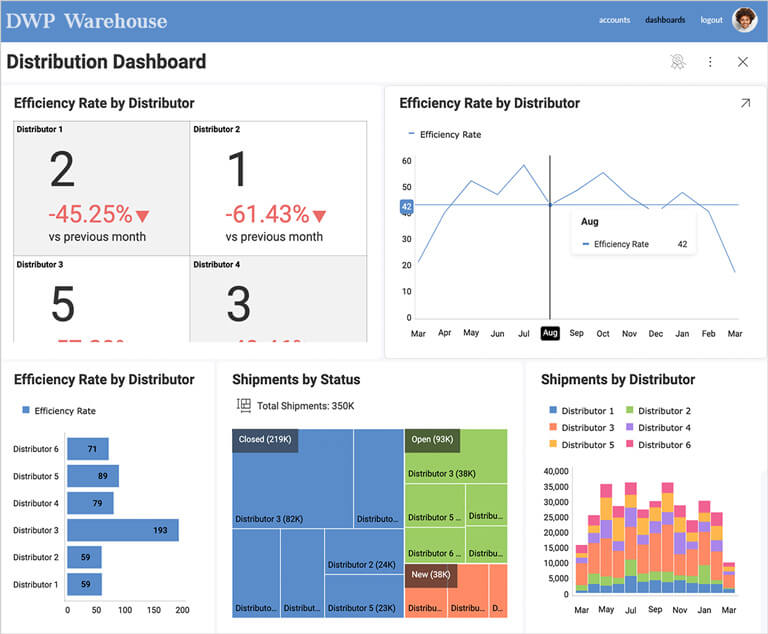

Supply chain analytics helps organizations across all industries make smarter, faster, and most importantly, data-driven decisions about their business operations that can affect quality, delivery, customer experience, and ultimately, profitability. The better a company performs supply chain analytics, the better it will be able to understand its customers and their needs.
Real-time actionable insights about your orders empower you to improve the entire order management cycle and strengthen customer relationships. For example, analytics can help businesses maintain optimal inventory levels and fulfill all customer orders on time to ensure customers stay loyal and don’t stray to the competition.
Procurement professionals can gain accurate, timely, and actionable insights into their company’s overall procurement spending and streamline their procure-to-pay processes. Moreover, analytics helps increase the efficiency of the procurement functions and free up extra time to focus on strategic activities.
Supply chain analytics help you combine all of your previous orders data with real-time market analysis to create a better and more accurate demand forecast, much more successfully than human supply chain planners can. More accurate demand planning means you can avoid overspending on procurement and keep costs down while still meeting customer’s demand.
Analytics solutions allow businesses to identify risks and help predict future risks by spotting trends and patterns throughout the supply chain. Advanced supply chain analytics can also help identify such risks at the onset so your teams can act at the right moment and reduce the risk impact for the business.
A supply chain dashboard is a reporting tool that helps businesses track inventory levels, warehouse operations, logistics, and supply chain KPIs to help professionals gain deeper understanding of how they perform and in which areas is there room for improvements.
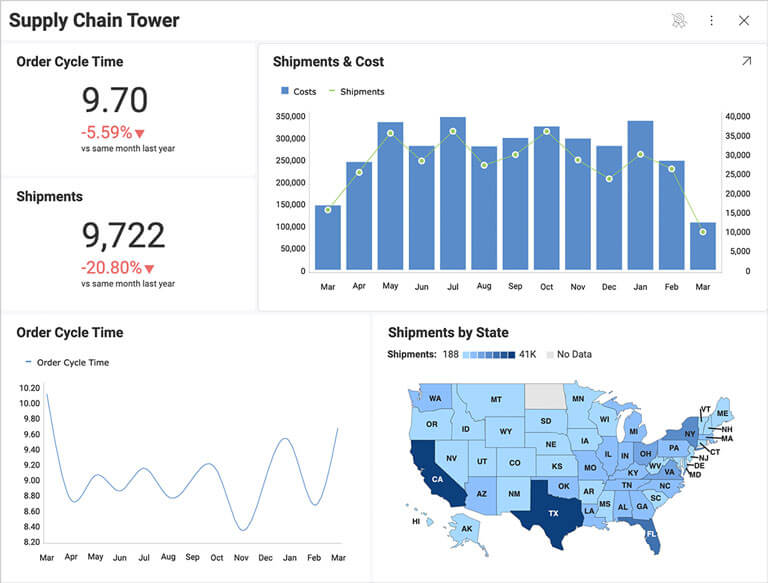
A supply chain control tower is a dashboard containing data and key business metrics of the supply chain. It enables businesses to better understand, prioritize, and resolve critical issues in real-time by monitoring inventory, shipment, costs, and more.
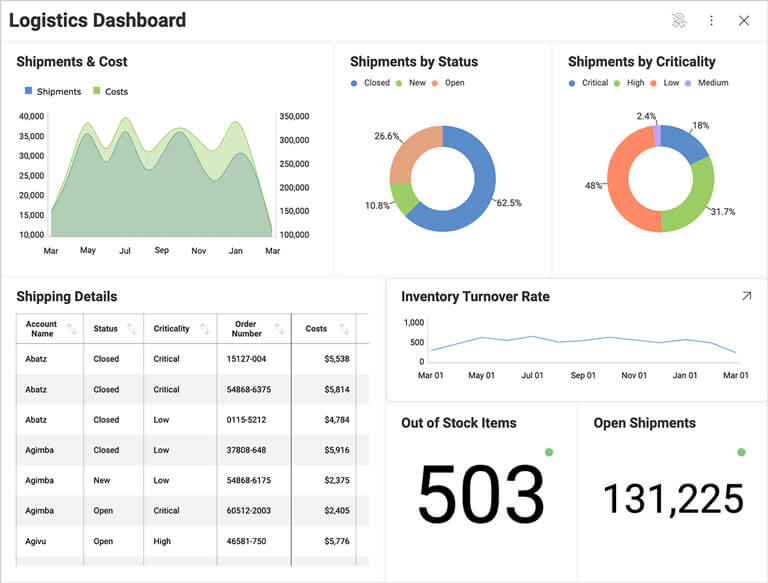
A logistics KPI dashboard allows supply chain professionals to monitor and report on important performance metrics concerning transportation processes, picking and packing of orders, warehouse operations and overall supply chain logistical management.
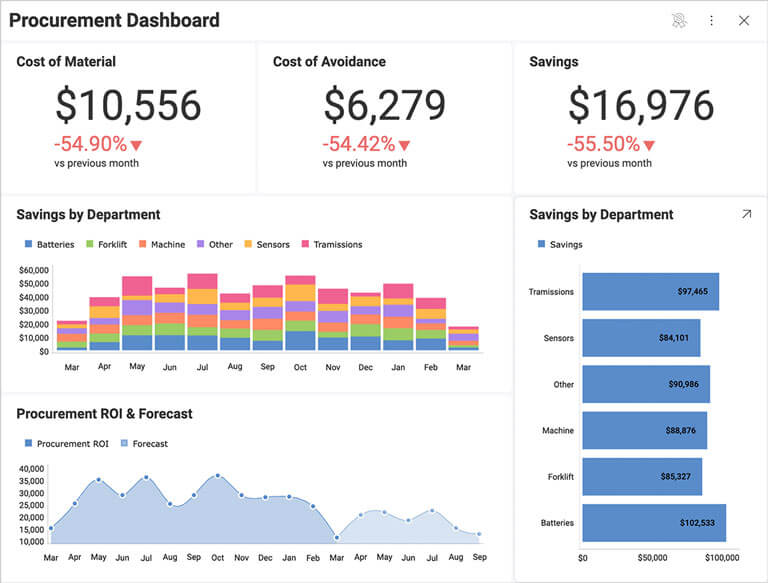
The purchasing manager requires a very focused and comprehensive management of the entire supply chain, from beginning to end. A procurement dashboard enables purchasing managers to efficiently track all processes with the help of procurement KPIs such as purchase order cycle time, compliance rates, and others.
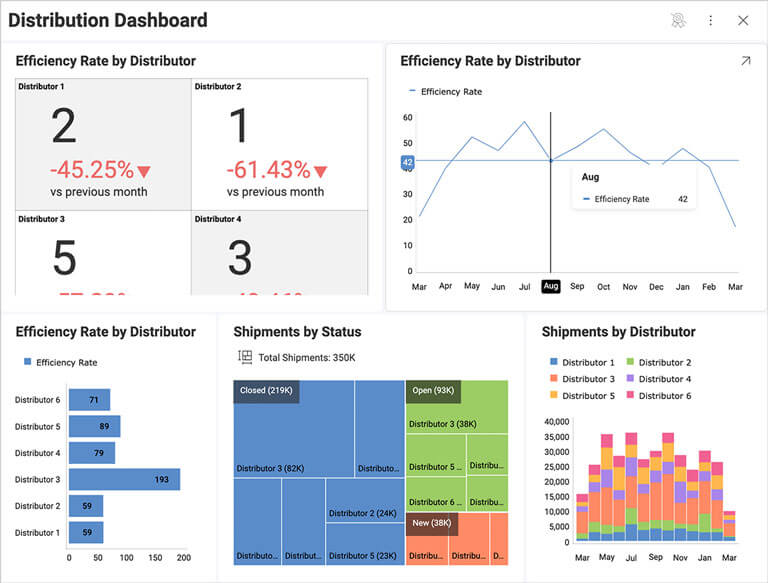
A distribution performance dashboard helps you identify which distributors are delivering orders on time, keep track of the numbers of shipments, and managing distributor routes. By having a clear view of distribution performance, managers can make more intelligent decisions to improve productivity and profitability.
A vast amount of supply chain data is unstructured and requires advanced analytics tools to make sense of it. Data analytics is used in supply chain management by fostering the use of AI and machine learning in order to extract hidden patterns in the data to gain valuable and actionable insights.
The main types of supply chain analytics are descriptive, predictive, prescriptive, and cognitive. Each type of data analysis plays a different role in helping you manage your inventory.
Logistics key performance indicators (KPIs) are performance metrics used by businesses to measure performance within the logistic department. They can measure a variety of measures related to transportation, delivery of goods, warehouse, and supply chain aspects.
Supply chain key performance indicators (KPIs) are performance metrics used by businesses to monitor the effectiveness and efficiency of various supply chain processes and reveal how they are meeting their targets. These metrics uncover helpful insights like inventory turnover, order accuracy, and inventory velocity.
Reveal equips your decision-makers with advanced data analytics capabilities and interactive visualization tools. This enables them to easily access key data insights, identify risks and opportunities, and take action based on these insights in a timely manner. Reveal is a self-service embedded analytics solution, ensuring that all users, regardless of their technical or data analytics knowledge, can quickly uncover insights, understand them, and apply them in their daily workflow.
Reveal will bring the power of data into the hands of your decision-makers so they can easily identify risks and opportunities and act at the moment of impact. It is a self-service software, which means that all of your users, even those not trained in data, will be able to easily and quickly gain insights, understand data and apply it into their daily workflow.
Back to Top